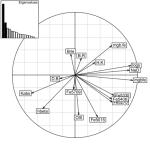An object approach for the automated galaxy detection task in MUSE hyperspectral data
1 : Grenoble Images Parole Signal Automatique
(GIPSA-lab)
-
Site web
Université Stendhal - Grenoble III, Université Pierre Mendès-France - Grenoble II, Université Joseph Fourier - Grenoble I, CNRS : UMR5216, Institut Polytechnique de Grenoble
Gipsa-lab 961 rue de la Houille Blanche BP 46 F - 38402 GRENOBLE Cedex -
France
This communication focuses on the automated galaxy detection task in the hyperspectral data cube provided by the MUSE spectrograph. A marked point process detection framework is used, yielding a natural sparse representation of the MUSE data. The estimation of the parameters and the detection of the galaxy configuration are performed jointly, within a fully Bayesian framework. The model is designed to be scale
invariant in order to take into account the high dynamical ranges that exist in the data cube. The galaxies are detected from benchmark data mimicking real data. Their spectrum and the spectral properties of the astrophysical background are also estimated.
invariant in order to take into account the high dynamical ranges that exist in the data cube. The galaxies are detected from benchmark data mimicking real data. Their spectrum and the spectral properties of the astrophysical background are also estimated.

 PDF version
PDF version
